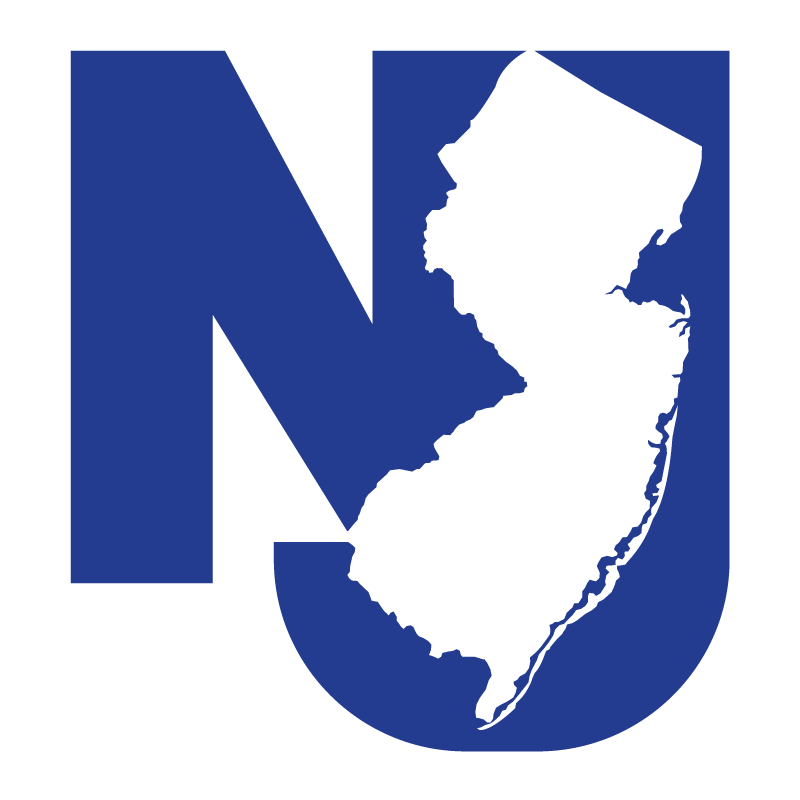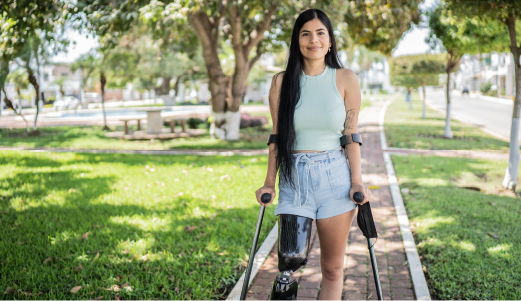Physical Disabilities and Brain Injury
Individuals with physical disabilities or brain injuries, including traumatic brain injury (TBI), may need additional supports in order to live their lives to the fullest. In New Jersey, the Department of Human Services, Division of Disability Services (DDS), serves as the lead state agency representing the interests of individuals by providing information and support to enhance health, education, employment, recreation, and social engagement. This page lists some of the many resources available to individuals with disabilities through DDS, including:
- Information and Referral (I&R) Services
- The Traumatic Brain Injury Fund, and
- The Personal Assistance Services Program
Get Help Now
- For more information about services and supports for individuals with disabilities, please contact the Division of Disability Services to be connected with a DDS Community Resource Specialist to answer questions about available services at 1-888-285-3036, or visit the DDS websiteContact Us page.
- To stay current with the latest information from DDS, you can subscribe to the DDS listserv by selecting “Subscribe for email updates” at the bottom of the DDS website homepage.
Services for Individuals with Physical Disabilities
- Information and Referral (I&R) Services
Through a toll-free hotline, 1-888-285-3036, nationally certified Community Resource Specialists (CRSs) are available during regular business hours, Monday through Friday, to assist New Jersey residents with disabilities in navigating and accessing community supports and State programs. For more information, visit the I&R website.
- Personal Assistance Services Program (PASP)
The PASP is a personal care assistance program for individuals with permanent physical disabilities who are capable of directing their own services. The program provides up to 40 hours per week of routine, non-medical personal care assistance to adults aged 18 years and older who are employed, preparing for employment (attending school or other training), or engaged in volunteer work. Personal assistants help with personal care tasks including, but not limited to: bathing, dressing, eating, grooming, meal preparation, shopping, light housekeeping, driving, or using public transportation. Eligibility is open to all who meet the above criteria, regardless of earnings. There may be a cost share based on income.
For more information and to apply for services, visit the PASP web page.
-
NJ ABLE
For Supplemental Security Income (SSI), account balances of up to and including $100,000 are excluded from the SSI resource limit. If an individual’s balance exceeds $100,000, the SSI cash benefit will be suspended, but they will continue to be eligible for Medicaid. Once the balance falls below $100,000 again, the cash benefit will be reinstated automatically—no need to reapply.
With NJ ABLE, eligible individuals with disabilities can save money for disability-related expenses in tax- advantaged savings and investing accounts. Savings in ABLE accounts are disregarded when determining eligibility for many government assistance programs with asset thresholds, including but not limited to: Medicaid, Supplemental Nutrition Assistance Program (SNAP), the Free Application for Federal Student Aid (FAFSA), and Housing and Urban Development (HUD) programs.
Allowable withdrawals or expenses are not limited to medical necessity and can include: education, housing, transportation, personal support services, and more. The individual with the disability is the account owner, and anyone can contribute to the account. Income earned by the account is not taxed.
For more information about starting an account, visit the NJ ABLE web page.
For more information regarding services provided by DDS and to access electronic versions of publications, visit the Division of Disability Services. To stay current with the latest information from DDS, you can subscribe to their listserv by selecting “Subscribe for email updates” at the bottom of the DDS homepage.
i
Resources for Individuals with a Brain Injury
Living with a brain injury, such as a traumatic brain injury (TBI) or an acquired brain injury (ABI), can present unique challenges. A TBI is caused by an external force, like a bump, blow, or jolt to the head, disrupting brain function. It can be classified as closed (non-penetrating) or open (penetrating), and ranges in severity from mild to severe. An ABI, on the other hand, occurs after birth and is not hereditary, congenital, degenerative, or caused by birth trauma. It can lead to cognitive, physical, emotional, or behavioral impairments that may cause temporary or permanent changes in functioning.
The resources below are designed to help individuals with brain injuries achieve their goals and improve their overall quality of life.
i
The Traumatic Brain Injury Fund (TBI Fund)
The TBI Fund provides services and supports to New Jersey residents of any age who have a traumatic brain injury. The TBI Fund aims to foster independence and maximize quality of life when insurance, personal resources, and/or public programs are unavailable to meet those needs.
Services include, but are not limited to: companion care; personal care; household management; assistive technology; physical/occupational therapies; cognitive rehabilitation therapy; and home/vehicle modifications.
An eligible applicant must be a New Jersey resident for at least 90 days prior to the application date, have liquid assets less than $100,000, and have a medically documented traumatic brain injury. For more information or to apply for the TBI Fund, visit the TBI Fund website.
i
Brain Injury Alliance of New Jersey
The Brain Injury Alliance of New Jersey provides information, education, advocacy, and assistance in connecting with resources for individuals with brain injuries. Visit the Brain Injury Alliance website for more information, or call their helpline at 1-800-669-4323. You can also reach them via email at info@bianj.org.
i
Personal Care Services
Personal care services are services that support people who are unable to perform activities of daily living on their own. Personal Care Services can be obtained through several programs.
Personal Care Assistant Service (PCA)
PCA services are non-emergent, on-going health related tasks performed by qualified staff in an eligible NJ FamilyCare (Medicaid) member’s home. The purpose of the program is to provide assistance with activities of daily living and household duties essential to the individual’s health and comfort. To apply, contact your NJ FamilyCare Managed Care Organization (MCO).
i
Personal Preference Program (PPP)
The PPP offers an alternate way for individuals to receive their NJ FamilyCare Personal Care Assistant (PCA) services. This program enables eligible NJ FamilyCare recipients to direct and manage their PCA services rather than receiving traditional PCA agency services. NJ FamilyCare recipients work with a financial management service to help develop a plan through which they can decide the services they need, as well as the individuals and/or agencies they wish to hire to provide the identified services. To enroll, contact your NJ FamilyCare Managed Care Organization (MCO) and ask to speak with a Care Manager.
i
Personal Assistance Services Program (PASP)
The PASP is a personal care assistance program for individuals with permanent physical disabilities who are capable of directing their own services. The program provides up to 40 hours per week of routine, non-medical personal care assistance to adults ages 18 and above who are employed, preparing for employment (attending school or other training), or engaged in volunteer work. Personal assistants help with personal care tasks including, but not limited to, bathing, dressing, eating, grooming, meal preparation, shopping, light housekeeping, driving, or using public transportation. To apply, contact your county PASP Coordinator. For more information and County Coordinator contact information, visit: www.nj.gov/humanservices/dds/programs/personalassistance/.
i
Jersey Assistance for Community Caregiving (JACC)
Jersey Assistance for Community Caregiving (JACC) is a program that provides in-home services to seniors aged 60 and over who require a nursing facility level of care but wish to remain in their homes. Qualified individuals may have the opportunity to hire their own eligible family, friends, or neighbors to provide the care they need.
Services available through JACC include the following: care management, personal care assistance, caregiver relief (respite), home modifications, special medical equipment and supplies, chore services, personal emergency response system, home-delivered meal services, social adult day care, and transportation. JACC has a monthly co-pay based on the participant’s (and spouse’s) income. For more information, visit: https://www.nj.gov/humanservices/doas/services/a-k/jacc/
i
Managed Long Term Services and Supports (MLTSS)
The Managed Long Term Services and Supports program (MLTSS) is a New Jersey initiative intended to provide a better way to help seniors and individuals with disabilities live at home for as long as possible. MLTSS also provides access to private duty nursing services for children requiring a skilled level of care. For more information about MLTSS, visit: www.nj.gov/humanservices/dmahs/home/mltss.html
i
Programs of All Inclusive Care for the Elderly (PACE)
PACE provides frail individuals, age 55 and older, comprehensive medical and social services coordinated and provided by a team of professionals in a community-based center and in their homes, helping program participants delay or avoid long-term nursing home care. To participate in PACE, an individual must be 55 years of age or older, require nursing home level of care but be able to live safely in the community at time of enrollment with the services of PACE, and reside in the service area of a PACE organization. You can leave a PACE program at any time. For more information, visit https://www.nj.gov/humanservices/doas/services/l-p/pace/.
i
Community Resources
Care2Caregivers Program
Care2Caregivers provides free and confidential telephone counseling, education, support, referrals, and resources for New Jersey individuals and the caregivers who support them. Trained peer counselors who have also been family caregivers can help with every step on the caregiving journey.
The Caregiver Action Network (CAN)
The Caregiver Action Network serves a broad spectrum of family caregivers ranging from the parents of children with special needs to the families and friends of wounded soldiers; from a young couple dealing with a diagnosis of MS to adult children caring for parents with Alzheimer’s disease. CAN provides education, peer support, and resources to family caregivers across the country free of charge.
American Healthcare Association (AHCA)
AHCA advocates for quality care and services for individuals who are frail, elderly, and/or have disabilities.
Well Spouse Association
The Well Spouse Association advocates for and addresses the needs of individuals caring for those with chronic illnesses or disabilities by offering peer-to-peer support and educating healthcare professionals and the general public about the special challenges and unique issues “well” spouses face every day.
National Alliance for Caregiving
The National Alliance for Caregiving is a nonprofit coalition of national organizations focusing on issues of family caregiving. Alliance members include grassroots organizations, professional associations, service organizations, disease-specific organizations, a government agency, and corporations.
i
Dysautonomia
i
What is Dysautonomia?
Dysautonomia is a term used to describe a group of medical conditions that affect the autonomic nervous system—the part of the body that controls involuntary functions such as heart rate, blood pressure, digestion, pupil dilation, kidney function, and temperature regulation. Individuals with dysautonomia often struggle to regulate these systems, leading to symptoms such as lightheadedness, fainting, irregular heart rate, unstable blood pressure, and in severe cases, malnutrition or even death. 10 Facts About Dysautonomia
Although not widely recognized, dysautonomia affects over 70 million people worldwide and can impact individuals of any age, gender, or race. Click here for more information about dysautonomia. i
i
Dysautonomia Resources and SupportsI
Dysautonomia International is a volunteer-run nonprofit organization that aims to identify causes and treatments for all forms of dysautonomia while improving quality of life for those living with these conditions. The organization is supported by patients, families, physicians, and researchers. Dysautonomia International’s New Jersey Support Group has over 1,600 members, with hundreds of monthly discussions around treatment, local resources, and support.
For more information, including educational resources, community connections, and supports, visit: www.dysautonomiainternational.org
 Official Site of The State of New Jersey
Official Site of The State of New Jersey
